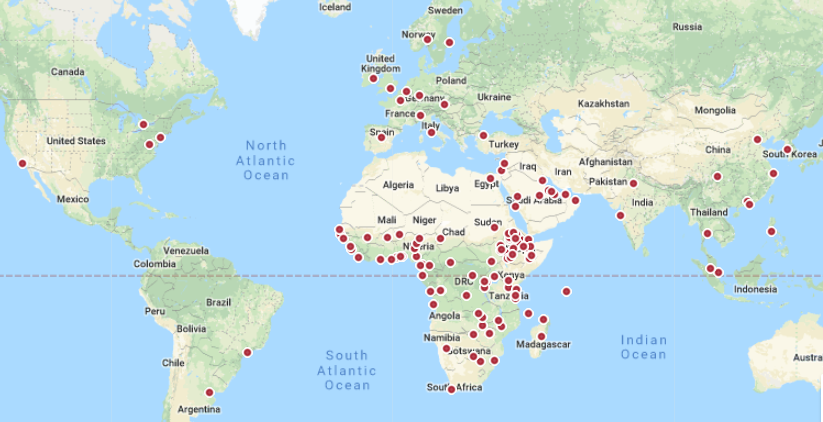Summary:
- Ethiopian Airlines to launch a four times weekly service between Addis Ababa and Manchester from 01-Dec-2018, initially operating via Brussels;
- New route continues Manchester Airport's success and first mover status in attracting non-London long haul services;
- Ethiopian Airlines' arrival is more about 'Africa' than just Ethiopia, with the airline's network offering connections to 58 countries via Addis Ababa, most of them in Africa;
- Despite an estimated annual market of 400,000 passengers from Manchester to/from Africa, only time will tell if Ethiopian Airlines has the marketing credentials to make a success of this route.
Ethiopian Airlines has announced it will commence a four-times weekly service between Addis Ababa and Manchester on 01-Dec-2018, initially operating via Brussels. The airline will operate the service with two-class (Business/Economy) Boeing 787 Dreamliner equipment. Manchester will be the carrier's second destination in the UK after London Heathrow.
Manchester has been the first mover in attracting non-London long haul services since the mid-1980s, such as American Airlines' Chicago route, Singapore Airlines, Qantas, Cathy Pacific, Malaysia Airlines, several BA services (New York, Hong Kong, for example) and latterly Saudia, Hainan Airlines and Oman Air, some of which have stayed the course while others haven't. One (Cathay) has come, and gone, and come back again.
Ethiopian's arrival is more about 'Africa' than just Ethiopia, with the airline's network offering connections to 58 countries via Addis Ababa, most of them in Africa (and some in the Middle East and Asia) and particularly strong on sub-Saharan routes. It might even challenge the Middle East hub carriers Emirates Airline, Etihad Airways and Qatar Airways on some routes.
MAP - The Ethiopian Airlines network now spreads to more than 100 destinations, including more than 50 across Africa Source: CAPA - Centre for Aviation and OAG
Source: CAPA - Centre for Aviation and OAG
The route is based on traffic statistics that show that 400,000 people in Manchester Airport's catchment area are travelling to key cities across Africa including Addis Ababa each year via other options. Ethiopia is also the second most populous country in Africa, with over 100 million inhabitants and a growing, if not exactly burgeoning, Middle Class. The World Bank thinks it will become a 'Middle Income' country by 2025.
While the route initially operates via Brussels there is no reason why it should not ultimately operate as a 'standalone' service or why Manchester could not be the fifth freedom point to an onward destination as is the case in Dublin with the Ethiopian service there. However, most major North American cities are now covered by direct services from Manchester and the UK-US bilateral has to be renegotiated as a result of the UK leaving the European Union.
Another 'winner' is the so-called 'Northern Powerhouse', once just an idea, then a strategy and now an entity with its own Government Minister. It seeks to re-balance the British economy, drawing emphasis and investment away from the southeast of the UK. It has also taken on the role of preparing the region of some 15 million people for new economic opportunities beyond "Brexit" in Mar-2019, including within Africa. The Powerhouse has been flagging recently, with major rail upgrades downgraded so to speak by the Government so this announcement is of great significance.
Potentially the route opens up new export markets not only in East Africa but throughout much of the continent. The flight timings are such that the value of the Addis Ababa hub is optimised, the aircraft actually staying on the ground in Manchester for several hours more than it needs to in order to maximise the transit opportunities with as little time spent in the capital's Bole International Airport as possible. Tourism should also be boosted, while the service will offer easy access to universities in Manchester and the Northwest of England generally that are positively thriving on foreign students and the high fees they pay. Those universities will sure to now be updating their Africa strategy.
The key question is whether the public will use the services. Socio-economic projections are one thing; winning business is another. There will not be massive demand to Addis Ababa itself (though there might be a growing demand from there). Most of the passengers will travel on connecting services but with many destinations that will mean winning them from Emirates, Qatar Airways, Etihad, Turkish Airlines, KLM, Lufthansa and other airlines that are already well-established in the Manchester market and not likely to give them up without a fight.
Then there is the question of how far the influence of the 'Northern Powerhouse' goes. Living 'in it' does not automatically mean that you support the international air services that operate from it. Potential passengers in places like Newcastle or Leeds or Sheffield might prefer still to fly via London from their local airport where they can or via a European hub rather than make a surface journey to Manchester for what is (initially) not a direct flight anyway. That has been a problem for Manchester Airport, which loses up to four million passengers a year to Heathrow alone, for many years.
Also, for business passengers it is not a daily service which means some traffic will always be lost to the opposition. Only time will tell if Ethiopian has the marketing credentials to make a success of this route.